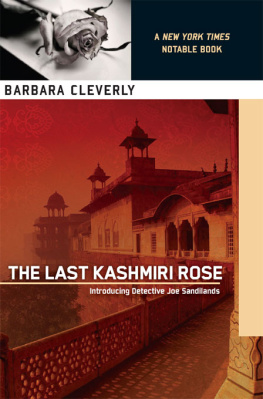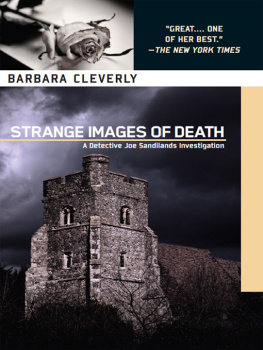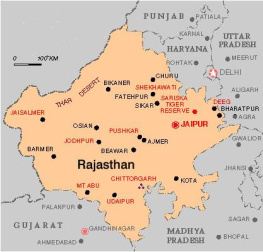Barbara Cleverly - The Palace Tiger
Here you can read online Barbara Cleverly - The Palace Tiger full text of the book (entire story) in english for free. Download pdf and epub, get meaning, cover and reviews about this ebook. year: 0101, publisher: Constable & Robinson, genre: Detective and thriller. Description of the work, (preface) as well as reviews are available. Best literature library LitArk.com created for fans of good reading and offers a wide selection of genres:
Romance novel
Science fiction
Adventure
Detective
Science
History
Home and family
Prose
Art
Politics
Computer
Non-fiction
Religion
Business
Children
Humor
Choose a favorite category and find really read worthwhile books. Enjoy immersion in the world of imagination, feel the emotions of the characters or learn something new for yourself, make an fascinating discovery.

- Book:The Palace Tiger
- Author:
- Publisher:Constable & Robinson
- Genre:
- Year:0101
- ISBN:9781780337685
- Rating:4 / 5
- Favourites:Add to favourites
- Your mark:
- 80
- 1
- 2
- 3
- 4
- 5
The Palace Tiger: summary, description and annotation
We offer to read an annotation, description, summary or preface (depends on what the author of the book "The Palace Tiger" wrote himself). If you haven't found the necessary information about the book — write in the comments, we will try to find it.
The Palace Tiger — read online for free the complete book (whole text) full work
Below is the text of the book, divided by pages. System saving the place of the last page read, allows you to conveniently read the book "The Palace Tiger" online for free, without having to search again every time where you left off. Put a bookmark, and you can go to the page where you finished reading at any time.
Font size:
Interval:
Bookmark:
Barbara Cleverly
The Palace Tiger
Chapter One
Northern India, 1922
Putlis mother, her hands on her hips, straightened painfully, glad after two hours to break the rhythmic coordination of arm and shoulder, glad to stand back and count the mounting bundles of tall cut grass that had fallen to the steady swish of her sickle. The weight of the coming baby was beginning to unbalance her and slow her down. There was no doubt of that, but an early start while the oat grass was still wet had paid off and she was pleased. She called out a practised musical cry answered by her daughter working a few yards behind her on the steep slope that led up to the forest beyond the village. Glad to share this pause, mother and daughter smiled with wordless tenderness.
Her mother looked with satisfaction at the eight-year-old girl. Yesterday had been the most important day of her daughters life. She had been fted and spoiled by the whole village and fed to bursting with puris and rich milk and sweetmeats. It had been her wedding day. Putlis mother had been proud to see the pretty girl, her eldest child, dressed for the first time in the costume of a married woman. No longer the infant in simple cotton dress, she was now wearing the tight blue bodice, the short skirt and the chaddar of the women of her tribe.
Putlis mother remembered the two small brown right hands clasping each other as the bride and groom made their marriage vows and she had been happy to see that the boy chosen from a neighbouring village was as strong and handsome as her daughter. The bridegrooms mother, a distant cousin, had earned her approval too and this was very important for Putlis mother. In a few years Putli would leave her family home and go to join her young husband as his wife and become a part of his family. This was the way of it with girl children. Putlis mother acknowledged and accepted it but she would be sad. Oh, she had two good sons who had come after Putli and of these she was rightly proud, but it was her oldest child who was secretly her joy. She had a loving husband who had allowed her without question to rear Putli although not all mothers of first-born girl children were so lucky. And her care had been rewarded by the constant good humour and energy of the child. She would miss her sleepy smile as she rose uncomplaining in the early morning to help with the meal and polish the cooking pots; she would miss her chatter as they brought back the cows or harvested the wheat. The light of her life would too soon be shining at another womans hearth.
Putli opened her mouth to shout something to her mother but her mother never heard the words. In deep and stealthy silence a gold and black shape detached itself from the grass behind Putli and leapt at her. An iron-clad paw scythed through the air and severed the slender neck with one blow. The dark head, still entangled in its chaddar, fell to the ground and the tiger, seizing the body in its jaws, turned to make off through the long grass towards the trees above. With a despairing howl, Putlis mother swung about. Rage, disgust and hatred gave strength to her slim arm and she hurled her sickle in a glittering arc at the savage face. By the grace of the jungle spirits, the spinning blade hit the tiger in the eye and, half blind, his shattering roar changed to an almost human cry of pain and affront. Releasing his prey, the beast shook the sickle from his great head, turned and in a second was again a shadow amongst the grasses. The crumpled body of Putli lay at her mothers feet.
Chapter Two
Simla, May 1922
Ambling down the Mall, Joe Sandilands steered his sweating hireling through the thickening crowds to return it to the stables at the Chummery, enjoying, as always, the early morning sounds of the waking town. Simla, the summer capital of British India, rose early and went about its business at a brisk pace. Uniformed men were striding between the military establishments along the Mall, red-coated chaprassis, message boxes on hips, were speeding from Post Office to government buildings, their energy fuelling the flow of information spreading out from this unremarkable street and pulsing around the world. Joe shook his head half in admiration, half in disbelief. The eccentric little town perched in the Himalayan foothills half-way between the scorching plains of India and the frozen summits of the Tibetan mountains looked like nothing so much as a displaced Godalming. And yet, between March and November, the mighty British Empire was governed from here and that meant half the world, Joe supposed, conjuring up a memory of the pink-coloured lands hed studied on his globe as a child.
Already the first nursemaids pushing baby carriages down the street were greeting each other, their fluting voices a treble accompaniment to the distant pounding of marching feet. As he wove through the purposeful crowds, Joe felt a stab of puritanical guilt to be at leisure when this small world was at work.
Not all of this small world though! He took comfort in the thought that his own temporary lack of occupation was as nothing to the endemic sloth he would find at the house he was about to visit. Eight oclock. The four inhabitants of the Chummery would most certainly be still in bed sleeping off whatever had been the indulgence of the previous night, or, at best, tremulously astir. With any luck he would be able to sneak off back to the Residence without announcing himself. But then he remembered that there was in his pocket a telegram. He had been charged by Sir George Jardine, his host, the acting Governor of Bengal, to deliver this to Edgar Troop. Edgar, the leader of the louche cterie that inhabited the once grand house on Mount Pleasant, earned his position in the group by being the oldest, the most enterprising and the most unscrupulous. Unaccountably, he seemed to have Sir Georges confidence. He did not have Joes confidence and though they had stood shoulder to shoulder in dangerous circumstances in the wilderness with that instinctive understanding and trust that two military men fighting towards the same objective experience, Joe found Captain Troop enigmatic, his style of living repellent. When he asked himself why he continued to spend more than a polite five minutes with the man, he had to admit that Edgars cheerful cynicism and his appetite for life were ultimately seductive.
Youll be returning your horse to the Chummery? Well now, when you get there Id like you to deliver this to Edgar in person, Sir George had said. Dont entrust it to anyone else in that hopeless establishment! Why? I dont often call at the Chummery but the last time I did so there were two telegrams on the mantelpiece. One was a year old and the other goddammit! was nearly two years old. Both unopened and one was from me! This could be important and I dont want it to go astray.
Joe didnt want to do this. He knew that if he was intercepted it would be nearly impossible to avoid a second breakfast leading to a drink or two, a morning of inconsequential gossip shading off into tiffin and imperceptibly into an afternoon moving lethargically round the snooker table. He wondered whether, if he rode round the back, he could hand his horse over, leave the telegram with a servant and make a discreet withdrawal, and this he resolved to try. To no avail. He had hardly turned into the compound before a window banged open and a cheerful voice summoned.
Must have smelled the coffee, Sandilands! Hospitably, the beaming face of Jackie Carlisle appeared at the window. Come on board and tell us the latest news! You who have the ear of the great and good must have something interesting to tell us in this otherwise uneventful town.
Joe knew that he was caught and Jackie continued, Heard someone say the other day, Where Sandilands goes, trouble follows. Come on, Joe, live up to your reputation enliven our dull lives.
Font size:
Interval:
Bookmark:
Similar books «The Palace Tiger»
Look at similar books to The Palace Tiger. We have selected literature similar in name and meaning in the hope of providing readers with more options to find new, interesting, not yet read works.
Discussion, reviews of the book The Palace Tiger and just readers' own opinions. Leave your comments, write what you think about the work, its meaning or the main characters. Specify what exactly you liked and what you didn't like, and why you think so.







